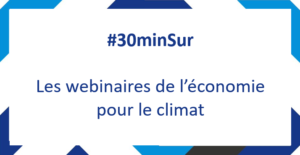#30minsur : Bonus-malus automobile : la nécessaire évaluation
Webinars - By : Louise KESSLER, PhD

Alors que les objectifs européens et nationaux impliquent une baisse drastique des émissions du parc de véhicules neufs d’ici 2030, il est difficile de savoir si les politiques publiques actuellement en vigueur sont à la hauteur de cette ambition. C’est en particulier le cas du bonus-malus, dont le barème n’est soumis à aucune évaluation ex ante de ses effets.
I4CE a eu le plaisir de vous convier à un webinaire très court pour échanger sur sa dernière étude sur l’évaluation climat du bonus-malus. Les auteurs ont présenté l’outil d’évaluation qu’ils ont développé et les conclusions qu’ils en tirent sur la cohérence du barème actuel avec la stratégie nationale bas-carbone. Jean-Philippe Hermine, Expert Senior Mobilité à l‘IDDRI s’est joint à eux pour échanger sur l’évaluation des politiques publiques en matière de mobilité.
Nos intervenants ont répondu également aux questions que les internautes ont posés dans le tchat.
Ce webinaire s’adressait à tous et pas seulement aux personnes déjà expertes de l’économie et du climat.
Intervenant.es :
- Louise Kessler, Directrice de Programme Economie à I4CE
- Jean-Philippe Hermine, Expert Senior Mobilité à l’IDDRI
